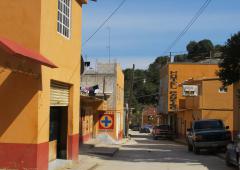Articles by: Levi Bridges
Guestworkers from Mexico, Jamaica, and Haiti meet seasonal demand at harvest time in New York's apple fields. Farm-owner John Teeple says that with the border so tight, we've actually trapped people so they can't go home.
In recent years, Honduras has become a chief transit point for drugs bound for Mexico and the United States. Local gangs, like the Mara Salvatrucha, often collaborate with Mexican drug cartels and have far more power and authority in most parts of Honduras than police. The combined lawlessness has caused Honduras to become the country with the world’s highest murder rate.
On Friday, May 3rd, President Obama gave a speech in the National Anthropology Museum in Mexico City. Speaking to a small crowd of mostly Mexican students, Obama said that the time has come for the U.S. public to look beyond the “sensational headlines” of violence associated with the drug trade and for the United States and Mexico to begin working together on “mutual interests and [with] mutual respect.”
Arturo Ramirez has crossed the border as an undocumented migrant every few years to work in the Florida orange groves. He says that stricter border enforcement implemented after September 11 made entering the United States far more dangerous and costly. But despite the increased risks, Ramirez headed for the United States.
Each year, Francisco Morelos leaves the small community in Mexico’s Querétaro state, and enters the United States to seek work. Many like him dream of starting their own business and do so by laboring in the United States as undocumented workers and sending their earnings back home.
On a cool morning in the central plaza of the Metropolitan Autonomous University in Mexico City, a group of volunteers wearing identical black t-shirts stands under a small tent. They are part of Jornaleros Safe, a project funded by several Mexican and American organizations whose members have spent the last year researching the exploitation of Latin American workers contracted for agricultural jobs in the United States.
 |
Tijuana’s links to San Diego go back centuries: from a dusty stopping point during the Mexican-American War, to the booming prohibition-era party town for U.S. revel seekers. Since foreign-owned factories moved in and businesses across the border looked for workers, Tijuana has become a reservoir of cheap local and cross-border labor, aggravating the city’s enduring social and economic problems.
 |
New security measures and plans for a massive border station threaten the fragile border economy of San Diego-Tijuana. Those most affected by these changes will likely be cross-border workers, family-run businesses, and small communities—on both sides of the border.




